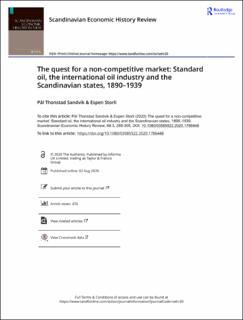The quest for a non-competitive market, Standard oil, the international oil industry and the Scandinavian states, 1890-1939
Peer reviewed, Journal article
Published version

Åpne
Permanent lenke
https://hdl.handle.net/11250/2688118Utgivelsesdato
2020Metadata
Vis full innførselSamlinger
Originalversjon
Scandinavian Economic History Review. 2020, 68 (3), 289-305. 10.1080/03585522.2020.1786448Sammendrag
This article focuses on the expansion of the international oil majors into Scandinavia in the period before World War II. From 1890, Standard Oil dominated the Scandinavian markets, but gradually the company’s hold on these markets was challenged by competitors. The article discusses how Standard oil achieved its market power in Scandinavia, and how the relationship between the company and its competitors, customers, and other stakeholders developed from 1890 to 1939. It also analyses how the Scandinavian governments reacted to the role of international cartels and the domination of large foreign multinationals in a sector that quickly was becoming more and more central to their economic development. The development of the Scandinavian oil markets is a prominent example of how big business actively worked to create uncompetitive markets by exploiting access to capital and control over the value chains. Gradually, this provoked public concern, yet finding the proper way to respond to the market power and the cartel and intra-firm co-operative practices of the mighty oil industry was no easy matter for the governments of small(ish) countries. By provoking public debate, the large oil companies’ quest for non-competitive markets proved a powerful incitement towards demonstrating the need for competition laws.
